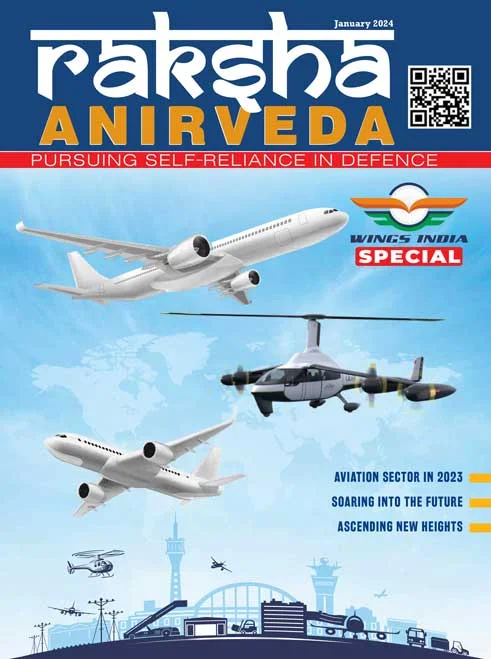As of March 2024, India ranks 12th in the list of most powerful countries; based on various factors, including economic conditions, international alliances, military strength and the like. A country’s global power is generally measured by its military and technological strength, financial dominance, cultural influence, and diplomatic relations. A country should have enough economic, military and political strength to wield influence in world affairs.
A global power must be strong ‘within’. This requires an effective national security strategy (NSS); enabling the citizens to enjoy the fruits of development in a safe and secure environment. National security has multiple facets: military security, political security, economic security, health security, personal security, energy security, food security, community security, digital security, and environmental security.
According to the IMF, India will likely be the 4th largest economy in 2025 surpassing Japan. At the same time, India’s external debt was placed at US$ 635.3 billion in September 2023 (increased from US$ 6.4 billion in June 2023), and in December 2023, the IMF warned India’s debt may exceed 100 per cent of GDP. India aims for a US$7 trillion economy by 2030, including technology, finance, integrated domestic market and inclusive growth.
In a pre-election rally, Prime Minister Narendra Modi said that 8.2 per cent growth is just a trailer. But sustaining growth needs much more investment. That is why, probably, India is now looking for even Chinese investments despite the continuing standoff along the LAC and India losing control of thousands of sq km of territory to China in Ladakh in 2020.
According to the World Bank’s ‘India Development Update’, India’s economy has demonstrated resilience despite a challenging external environment. The research titled ‘Navigating the Storm’ states that India’s development prospects would be affected by the worsening external environment. In this, an India-China war can hardly be ruled out wherein China would like to test its military and technological prowess on India before taking on the US.
India cannot be a global power without adequate military strength. India has not elaborated the national security strategy (NSS) so far despite the NSA Ajit Doval being officially tasked in 2019 to do so. Without NSS, defence planning amounts to shadow boxing. In terms of cyber-security (an essential component of national security) our Digital Infrastructure remains vulnerable to Distributed denial-of-Service (DDOS) attacks and the poor shape of BSNL exposes entire critical infrastructure to huge risk. Are we focused and spending enough on cyber-security? Can we take on China in this state?
India cannot be a global power without adequate military strength. India has not elaborated the national security strategy (NSS) so far despite the NSA Ajit Doval being officially tasked in 2019 to do so. Without NSS, defence planning amounts to shadow boxing
India’s 2024-2025 defence budget of Rs 6.21 lakh crore ($ 75 billion) is below 2 per cent of GDP, which doesn’t cater for the threats and the combat capability gap vis-à-vis China. In comparison, China’s 2024 defence budget is US$ 231 billion and China allocates US$ 70 billion for border infrastructure compared to India’s US$ 16 billion. We need an annual defence allocation of 4-5 per cent of GDP through the next decade to meet the China challenge.
Despite the ‘Make in India’ initiative, India continues to be the world’s largest defence importer. Ironically, the government’s focus is on defence exports, not on equipping the military. Moreover, under the Aatmanirbhar plan, the governmental defence set-up is not able to meet military requirements on time. The ‘Agnipath’ scheme erodes combat capability and needs to be scrapped; but it has become a case of political ego, with PM Modi saying it was asked for by the military, which is not the case. Why was it not first tried out in police and CAPF if considered so good?
India has the world’s largest poor population and ranked 111 in the 2023 Global Hunger Index. The UN estimated a billion plus Indians couldn’t afford a healthy diet in 2021 compared to India’s claim that only 813 million Indians require food assistance. Also, India’s per capita ranking is 139th – lower than that of even Bangladesh and Pakistan.
The top 10 social issues in India include poor sanitation facilities, healthcare, pollution, overpopulation, women’s safety, poor infrastructure (notwithstanding claims of ‘world-class’), high unemployment and corruption. No population census has been undertaken after February 2011 for fear it would expose actual figures of unemployment and reveal inadequate welfare schemes and housing plans based on estimates, new townships are not identified and delimitation remains stalled. Overpopulation implies pressure on resources, infrastructure, healthcare, education, and housing but there is no move for a population control bill.
IMF says India will likely be the 4th largest economy in 2025 surpassing Japan. However, India’s external debt was placed at US$ 635.3 billion in September 2023 (increased from US$ 6.4 billion in June 2023).
India is using its growing economic and political clout to expand its influence globally. India has heritage, linguistic and economic links in South Asia and has been working to revive the SAARC, proposing multiple initiatives; making SAARC more inclusive, increasing cooperation on regional issues, and improving connectivity between member states. India has close ties with Southeast Asia and East Asia (particularly with Japan). The US is India’s second-largest trade partner. In Europe, India has strong trade ties with many countries and has been working to strengthen its relationship with East Africa.
India has strong relations with the Middle East, particularly the UAE and other Arabian Gulf countries. Over 3,860,000 Indian expats are estimated to be living in the UAE, which is over 38 per cent of the total population of the UAE. India has signed FTA with Afghanistan, Australia, Bangladesh, Bhutan, Brazil, Ethiopia, Haiti, Israel, Kyrgyz Republic, Laos, Nepal, New Zealand, Malaysia, the Maldives, Pakistan, Peru, the Republic of Korea, Singapore and the UAE, plus a trade agreement with DPRK.
India is the second largest contributor to the United Nations peacekeeping operations and the second-largest donor of external aid in the world, contributing more than US$70 billion cumulatively to developing countries since Independence. India is a member of several intergovernmental organisations, including the United Nations, the World Trade Organisation (WTO), the Asian Development Bank (ADB), BRICS, SCO and the G20, which is widely considered the main economic locus of emerging and developed nations. Moreover, India is strengthening its economic, political and strategic relations with ASEAN also and has been playing an influential role in international organisations like the WTO, IMF and the Ease Asia Summit.
An India-China war can hardly be ruled out wherein China would like to test its military and technological prowess on India before taking on the US
However, in terms of diplomacy, India is found wanting in its immediate neighbouhood, with China continuing to draw them deeper into its strategic sphere, which is not only because of China’s economic clout. India needs to refrain from the ‘big brother’ attitude and explore avenues, in addition to fiscal, to exert influence. Also, India seems to be putting its immediate neighbours in second place compared to other world affairs.
A recent article in World Political Review titled ‘India May Not Have What It Takes to Be a Great Power’ highlights the following:
- India is unlikely to grow fast enough to become a high-income country by 2047 (by when Modi expects India fully developed) and instead could remain relatively poor.
- Global power is intrinsically linked to military power but India’s military reach is uncertain due to; a weak and under-strength air force, an army bogged down with strategic ideas formed in the last century; a navy comprehensively outclassed by China’s navy; not much by way of military modernis
- India lacks the intangible quality termed ‘status’ by international relations scholars; for projecting substantial authority. Being welcomed into the great power club is as much about perception as it is about reality
India has strong relations with the Middle East, particularly the UAE and other Arabian Gulf countries. Over 3,860,000 Indian expats are estimated to be living in the UAE, which is over 38 per cent of the total population of the UAE
It would be naïve to dismiss the above article outright because there is substantial truth in what has been said, notwithstanding the author saying the one factor that could accelerate India’s rise to great power ranks is victory in a major war with China; which is what the US-led West wants (an India-China war) to exact strategic and economic benefits.
Ironically, the widening gap with China is also coupled with a lack of political will in India in sharp contrast to the political chest-thumping. This is why the defence minister did not dare to direct blasting PLA tanks advancing on our positions in 2020 when informed by the then Army Chief. The prime minister warns Pakistan against stoking terrorism in J&K. But despite J&K facing full-scale LIC-Jihad and speculation of large-scale SSG infiltration there is no political will to similarly respond inside Pakistan/POK.
After External Affairs Minister S Jaishankar met China’s Foreign Minister Wang Yi on July 25, 2024, in Vientiane (Laos), hopes were for the LAC stabilising, but China has now begun constructing a new dual-village along the LAC in Demchok. The world witnesses all this without comment because various countries need our markets. China and Pakistan understand only the language of power, as does the world. That is why the US dare not invade North Korea. When will our political hierarchy understand this?
It is evident that we need to cover a lot to becoming a Global Power. We must act first and brag later. For example, there is consistent hype about India becoming the global industrial hub. But Narayana Murthy, former chairman of Infosys, has shown the mirror by saying it is ‘audacious’ to believe India will be a manufacturing hub. Will the government pay heed?
Finally, India has the resources, the youth and the brains. But the government needs to come down to Mother Earth and get its act together. Ignoring military strength would result in a severe blow to our economy in the event of war. We need systemic progression, not an ad hoc approach like the present one, to become a Global Power.
-The author is an Indian Army veteran. Views expressed are personal.
The author is an Indian Army veteran. The views expressed are of the author and do not necessarily reflect the views of Raksha Anirveda







